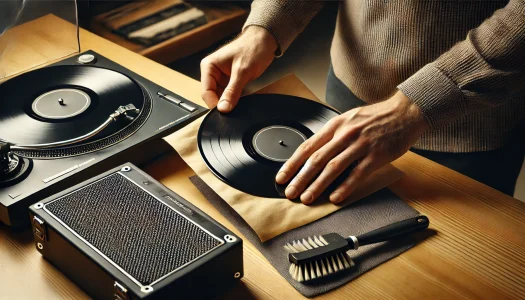Vinyl records offer a rich, warm sound that many audio enthusiasts consider unmatched by digital formats. However, they are delicate and require proper care to maintain their superior sound quality over time. Without the right handling and maintenance, vinyl can easily degrade—resulting in pops, skips, and permanent damage to the grooves. By taking a few simple steps to care for your collection, you can ensure that your records stay in excellent condition and provide decades of listening pleasure.
Proper Handling
Handling your vinyl records correctly is crucial to preserving their sound quality.
Wash Your Hands: Before touching your records, make sure your hands are clean and completely dry. The natural oils and dirt on your fingers can easily transfer to the vinyl, causing build-up in the grooves and affecting playback quality.
Touch the Edges and Label: Always hold the record by the outer edges or the center label. Avoid touching the grooves directly, as even small smudges can degrade the sound or cause unnecessary wear over time.
Cleaning Your Records
Regular cleaning is essential to maintain the sound quality of your vinyl and extend its lifespan.
Dry Brushing: Before and after each play, use a carbon fiber brush to remove surface dust and static from the record. This simple step prevents dirt from settling into the grooves and reduces wear on both the vinyl and the stylus.
Deep Cleaning: For a more thorough clean, use a dedicated record cleaning solution along with a microfiber cloth or a specialized cleaning machine. These tools can safely remove deeper grime and residue without damaging the vinyl.
Avoid Household Cleaners: Never use water, soap, or regular household cleaning products on your records. These substances can damage the grooves, leave residues, or even warp the vinyl, negatively impacting sound quality. Always use products specifically designed for vinyl cleaning.
Proper Storage
Storing your vinyl records correctly is key to preserving their shape and sound quality.
Store Vertically: Always store records upright, like books on a shelf. Storing them flat or stacking them can cause warping over time due to the uneven pressure on the vinyl.
Use Inner and Outer Sleeves: Protect your records by using anti-static inner sleeves to reduce dust and static build-up. Add an outer plastic sleeve to guard against dirt, moisture, and general wear on the album cover.
Keep Away from Heat: Vinyl is sensitive to temperature changes. Store your records in a cool, dry place, away from direct sunlight, heaters, or other heat sources, as excessive heat can cause the vinyl to warp or distort permanently.
Turntable Maintenance

Proper turntable maintenance is crucial to protect both your records and your sound quality.
Check the Stylus: Regularly inspect your stylus (needle) for dirt or wear. A dirty or worn-out stylus can cause significant damage to your records’ grooves and degrade sound quality. Clean the stylus gently with a soft brush, and replace it when it shows signs of wear to ensure optimal playback.
Correct Tracking Force: The tracking force of the tonearm should be set accurately according to your turntable’s specifications. Too much pressure can wear down the grooves, while too little can cause the stylus to skip. Make sure it’s properly balanced to preserve your vinyl.
Keep the Turntable Clean: Dust accumulates on the turntable’s platter and other parts, which can transfer to your records. Regularly clean the surface of the turntable, particularly the platter, to keep dirt from compromising your vinyl’s sound quality.
Playing Tips
Following best practices while playing your vinyl records helps prevent damage and ensures a smooth listening experience.
Avoid Scratches: Always handle the stylus with care when lowering it onto the record. Use the cueing lever to gently drop the needle into place for better precision and to avoid accidentally scratching the grooves.
Don’t Stack Records: Never play stacked records or pile them on top of each other, even between plays. This can cause warping, scratching, and uneven pressure on the grooves, which degrades sound quality and damages your vinyl. Always play one record at a time.
Handling Extreme Temperatures and Humidity
Vinyl records are sensitive to environmental conditions, so it’s important to store them in a controlled environment.
Optimal Conditions: Keep your records in a room where the temperature is stable, ideally between 60-70°F (15-21°C), with humidity levels around 40-60%. This helps prevent warping caused by heat or dryness, and avoids the risk of mold growth in overly humid environments.
Avoid Cold Climates: Extreme cold can make vinyl brittle, increasing the chances of cracks or breakage. If you’re storing records in cooler conditions, make sure they gradually return to room temperature before playing to avoid sudden temperature shifts that could cause damage.
Regular Inspection
Regularly inspecting your vinyl collection helps prevent long-term damage and ensures continued high-quality playback.
Check for Mold or Dust: Periodically examine your records for signs of mold, mildew, or excessive dust buildup. Catching these early prevents them from affecting the sound quality or spreading to other records in your collection.
Inspect Outer Sleeves: Over time, outer sleeves can wear out, tear, or become dirty. Replace any worn or damaged sleeves to ensure your records stay well-protected from dust, moisture, and other potential contaminants. Keeping sleeves in good condition is a simple way to prolong the life of your vinyl.
Closing Thoughts
Taking care of your vinyl records ensures they provide you with great sound for years to come. Always handle your records with clean hands, holding them by the edges to avoid smudges. Regular cleaning, proper storage, and maintaining your turntable are essential steps in preventing damage and preserving sound quality. By following these guidelines—cleaning, storing vertically, avoiding heat, and keeping your turntable in top condition—you can enjoy your vinyl collection for a lifetime, preserving both its value and audio integrity.
